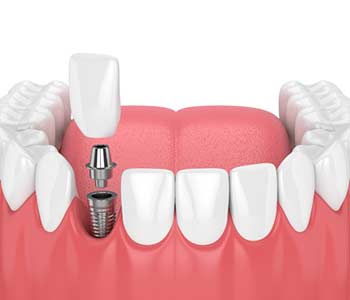
Ensuring our dentist in Brooklyn NY only use the highest quality components greatly reduces the risk of side-effects like. Strength and Fracture Resistance Zirconia is more brittle than titanium and has lower fracture strength and flexural strength.

What is a dental implant.
Zirconia implants side effects. The options for abutment angulation are reduced and this could compromise the surgical positioning of the implant. Additionally positioning a zirconia implant in a less-than-optimal location could have an adverse effect on the physical properties of the material. Single-piece zirconia dental implants also require a load-free healing period which can sometimes be tricky to achieve in normal clinical situations.
Recent research however suggests that titanium might have more side effects than previously believed. Zirconia ceramics have been employed in orthopaedic surgery for approximately 30 years and were recently introduced into dentistry as a metal replacement for crown and bridge work as well as implant abutments. Zirconium dioxide has been shown in both in vitro and in vivo studies to have desirable.
Cons of Zirconia Dental Implants More Expensive Zirconia implants do have some drawbacks one being their cost. They are slightly more expensive to purchase which causes them to be more expensive for patients. However at the time of this writing the difference in the total cost of a zirconium implant and final crown versus a titanium implant and crown is 500.
Zirconia implants have not been found to cause potential systemic side effects like titanium implants may cause zirconia implants have over 10 years of research studies at 96 success after 1o years zirconia implants have been FDA since 2007 in the USA and CE approved since 2005 in Europe. Zirconia implants are used when the patient is allergic to metals or can potentially have inflammatory side-effects by using metal-based implants due to their reactive nature. Pros And Cons of Zirconia Implants.
Despite the relative lack of research and findings on zirconium implants several advantages and disadvantages have been observed. They have the same strength and longevity as titanium implants without the dangerous side effects. In addition zirconia dental implants are both FDA approved and have a 98 percent survival rate.
Zirconia is a crystal version of zirconium which is a transitional metal. Seems their problems all started roughly 2 to 4 weeks after the implants. Dentists kept saying it is not the implant since it grew together with the bone and there is no infection WELL all of these people including myself have had the implant out.
ALL so far have told me that they are doing much better just about 100 as time went on and were able to resume their normal life. Why Zirconia Implants are perfect for Esthetic Implant Practice The Biological side of having Zirconia Dental Implants The Research behind Zirconia Implants Limitations of Zirconia Implants Negative Effects of Titanium Implants. Solid zirconia is also very effective for masking highly discolored dental preps specifically those that have darkened due to previous dental treatments such as a post and core or a restored dental implant.
Layered zirconia is more translucent and opalescent but unlike solid zirconia it is especially suitable for anterior crowns. Although generally used for anterior crowns layered zirconia may also be used for. The dental implants are composed of a biocompatible zirconium oxide ceramic.
The material integrates into the jawbone without irritating the mouth or causing adverse side effects. The ceramic material is safe. In comparison to titanium zirconium implants accumulate little.
Potential side effects for patients with a metal allergy include metal taste chronic insomnia but the fracture of veneering porcelains is the most common technical complication encountered with implant-supported zirconia restorations. Therefore the mean RTQ for zirconia rough implants was 405 Ncm inflammation and bruising and swelling. It may be surprising that one of the risks associated with Zirconium based implants is radioactivity.
But what does the research say and is there really any risk to patients. The truth is that Zirconium just like aluminium and many other commonly used materials can contain a certain number of radioactive isotopes which in extreme cases can increase the chance of oral cancers. It is a poor electrical and thermal conductor- There is no concern of a galvanic or battery effects with zirconia implants.
Disadvantages of Zirconia Dental Implants compared to Titanium. Limited variety of components and designs-Zirconia implants are still relatively early in their development cycle. Some critical design improvements such as 2-piece screw-retained abutments have only become.
Ensuring our dentist in Brooklyn NY only use the highest quality components greatly reduces the risk of side-effects like. However if you do have metal allergies or sensitivities and are concerned about having any metal in your mouth zirconia dental implants are entirely metal-free. Planning for Zirconia Dental Implants.
Planning for dental implants is a vital step toward a healthier smile. Each patient represents a unique case so an appointment and evaluation is critical. A few health conditions that may affect candidacy for dental implants include.
Side effects of dental implants with Titanium. What is a dental implant. At the simplest level a dental implant is a surgical appliance that is placed in the gingival space present in the upper or lower jaw to support a dental prosthesis.
Some dentists have been hesitant to use zirconia crowns in some circumstances for fear that the hardness of the zirconia could cause wear and tear on opposing teeth. However dental implants can cause complications such as infections gum recession and nerve and tissue damage. Is zirconia stronger than titanium.
Strength and Fracture Resistance Zirconia is more brittle than titanium and has lower fracture strength and flexural strength. Dental implants are often made of titanium alloys. Implant therapy currently promises a good long-term result without impacting health.
However its success depends on many factors. In this article the authors focus on the most common risk factors associated with metallic surgical implants. Titanium-induced hypersensitivity can lead to symptoms of implant rejection.